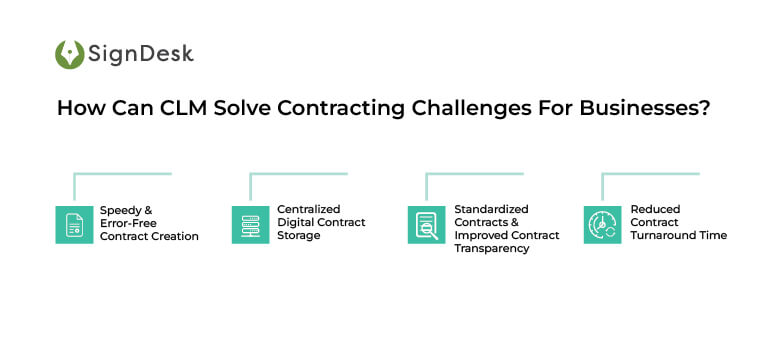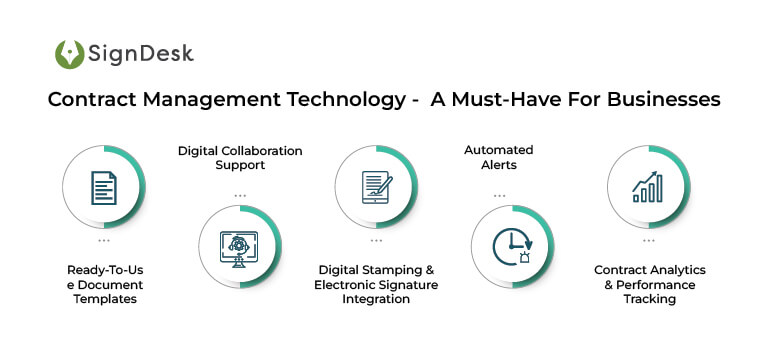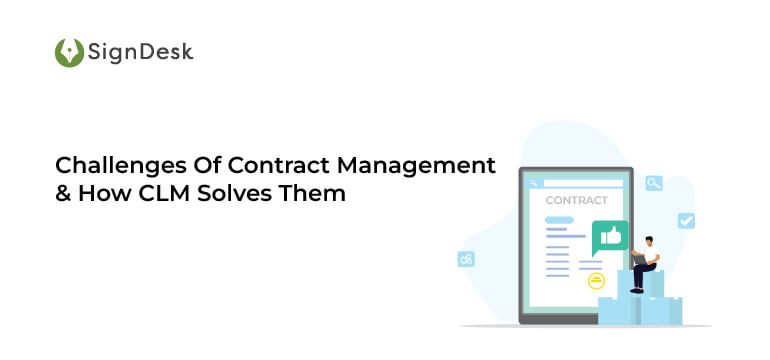Why Is Contracting Crucial For Modern Businesses?
Contracting has a significant impact on business performance because it sets a strong emphasis on revenue and expenses pertaining to any business undertaking. When businesses phrase their contracts inefficiently, even a small error can lead to the loss of a lot of revenue. This is due to the numerous challenges in contract management that accompany inefficient process flows.
Outdated methods & document management practices bring in several drawbacks to contract management. Without a smart approach, businesses continue to experience many challenges in their contract management process.
Only when managed appropriately, contracts can forge strong relationships & make way for increased profitability for the company in the long run. However, this key aspect of every business faces various challenges that can lead to inefficiencies & poor project performance in the long run.
The Main Challenges Involved In Business Contracting
A contract is a formal document that outlines the actions taken by the businesses & the conditions under which each will carry out its obligations when they want to conduct business with one another.
Managing large volumes of contracts on a day-to-day basis comes with its own set of challenges. According to a report, it can take up to 1445 days to enforce a contract in India. This is so because businesses have to deal with not just drafting & executing contracts but also have to track the progress of every agreement, ensuring compliance of the contracts’ terms & conditions to mitigate legal risks, negotiate clauses between parties, etc.
More often than not, contracting processes are disconnected from other business procedures, leading to contract-related workflow silos between departments, which can eventually lead to reduced productivity & lack of efficiency. Some of the major challenges in contract management include;
- Errors & Delays In Contract Drafting: Organizational productivity & targets can suffer when multiple teams are tasked in the execution of a contract. Drafting, revising & renewing contracts by different departments in a disorganized manner can cause inefficiencies throughout the contracting process.
Manual contract creation is prone to errors & takes up a much longer time. Also, when the contract structure, language & clauses are not up-to-date it can lead to issues such as non-compliance, which can further delay its implementation. This leads to missed project deadlines which can cost the business dearly. - Un systematized Contract Storage: Contract & document data storage create many problems that businesses have to deal with on a regular basis. Maintaining files & folders for physical documentation poses issues such as the lack of contract visibility, which leads to delays whenever a requirement for reviewing/amending an agreement arises.
Physical contracts can often compromise the security of data contained in them. In addition, contract version control & milestone tracking also become nearly achievable. - Lack of Standardization & Contract Transparency: The lack of standardization from the numerous teams & processes concerning a contract is one of the major problems companies face. The limited visibility of contracts also makes the entire process of managing contracts inefficient from various perspectives.
The lack of transparency is another significant problem which can cause agreements to not be completed to the company’s satisfaction. This creates complications with vendors, clients, etc. The lack of transparency & standardization of contracts hampers ongoing business relationships & makes them needlessly difficult to handle. - Lengthy Contract TAT: Another considerable problem among business contracts is the extended turnaround time. Drafting contracts from scratch or locating relevant data to create a document can be highly time-consuming.
The absence of an efficient contract management system can lead to slower approvals, adding to the TAT. It also makes it difficult to track the time a contract takes at each of its stages, leading to an inefficient way for businesses to manage their contracts.
Besides these complications, businesses also tend to overlook post-execution management of contracts. This is integral to oversee the performance of a contract & allows businesses to extract key insights to advance their projects.
The solution to all these challenges lies in adopting a smart contract management solution designed to streamline documentation workflows for businesses.
How Can CLM Solve Contracting Challenges For Businesses?
Smart contract management can greatly reduce workflow inefficiencies & enable businesses to run smoothly. CLM i.e., Contract Lifecycle Management is a cutting-edge solution that solves all the challenges that companies face with a traditional document management system.
Some of the significant improvements CLM brings with it can solve the challenges of contract management effortlessly.

- Speedy & Error-Free Contract Creation: CLM offers automated contract drafting & assembly which enables businesses to create error-free agreements quickly. Ensuring contract compliance becomes effortless with smart CLM, which makes sure the clauses set out on the contract stay compliant with regulatory requirements.
Features like clause locking, contract templates, & contract authoring wizard offered by CLM, enable a fast & faultless contract creation process businesses can benefit from. - Centralized Digital Contract Storage: A digital contract repository is an intelligent solution to storing large volumes of business documents securely. It enables teams to maintain & work on any required document on a single cloud platform.
A centralized storage solution allows businesses to retrieve & renew documents in much less time. It enables seamless collaboration, expedited contract tracking, & faster contract amendments. - Standardized Contracts & Improved Contract Transparency: When commercial contracts are non-standardized, the legal department is burdened to carefully review each of them to ensure that the firm is not put at risk.
Therefore, implementing smart, cutting-edge contract management software helps businesses maintain standardized documents & experience seamless workflows. - Reduced Contract Turnaround Time: CLM software expedites contract TAT by offering intelligent solutions that ease the contracting process. With features such as pre-made document templates, smart clause suggestions & online negotiation support, contract lifecycle management accelerates business contracting.
This brings down the turnaround time considerably, helping teams focus on the next phases of their projects.
An all-inclusive online contract management platform enables users to work on contracts simultaneously, improving efficiency & speed. It eases post-execution management of contracts by offering features like statistical data which businesses can use to analyze the contract’s performance.
In addition, with a contract lifecycle management platform, the contracting process will not be disconnected from other business processes, enabling a smoother workflow & contract execution.
Contract Management Technology – A Must-Have For Businesses
CLM is integral for any business that wants to digitize its documents & set up a more efficient contract management process. As even the largest of companies experience contract inefficiencies, a robust solution is necessary to alleviate the issues that arise.
Contract lifecycle management offers an enterprise-wide platform to mitigate documentation problems of businesses. The software-based solution to expedite, secure & improve organizational performance.
CLM offers various solutions that can effectively solve the problems that come with traditional document management processes. Some of the innovative solutions that CLM provides include:

-
- Ready-To-Use Document Templates: CLM software comes with a wide range of contract templates that businesses can use as per their needs. This significantly reduces the time that would otherwise be required for employees to draft agreements from scratch.
- Digital Collaboration Support: By offering a platform for parties to negotiate clauses of a contract online, contract lifecycle management eases business collaboration. The feature enables businesses to carry out their contract workflows more quickly & efficiently.
- Digital Stamping & Electronic Signature Integration: By offering inbuilt eStamp & eSign portals, CLM expedites contract approvals. It allows parties to authorize agreements remotely, leading to much lesser time spent on contract signature & stamping procedures.
- Automated Alerts: CLM adds convenience to the contract monitoring process by setting up real-time notifications alerting users to approve clauses, review amendments, etc. In addition, reminders for contract renewal & updates make managing contracts smoother.
- Contract Analytics & Performance Tracking: Smart contract management software has in-built smart analytics, to track contractual obligations & clause performance. Contract analytics convert this information into actionable business insights to improve decision-making.
SignDesk- Enabling Seamless Contract Automation For Modern Businesses
SignDesk offers businesses the ability to digitize their contract management process from end to end. SignDesk’s CLM Software is designed to resolve the various challenges of contract management. It does so by digitizing every stage of contract management, starting from its initial draft & covering processes like performance tracking & post-execution analysis, including a contract repository.
The smart contract tools offered by SignDesk simplify the documentation process for companies. Get in touch with our team of solution consultants to learn how CLM can transform your contracting process & enable business growth.
Get a free trial now!
